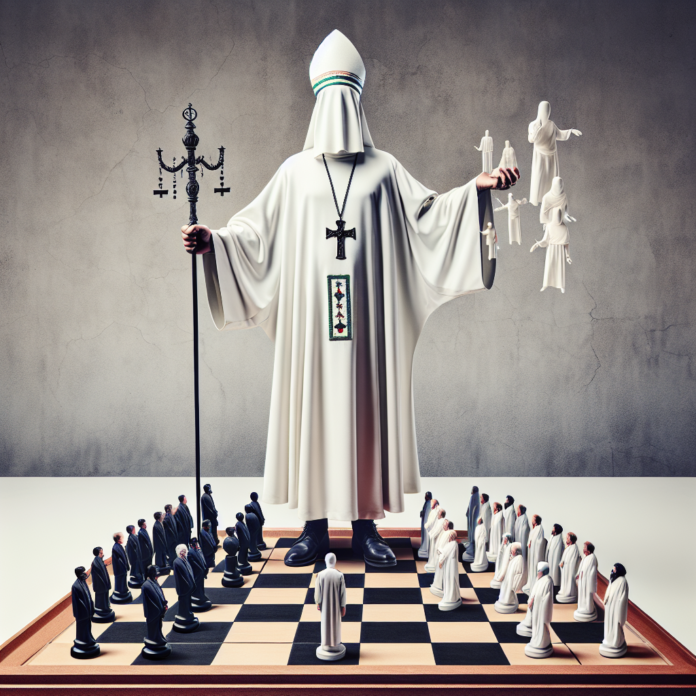Spiritual Leaders and Political Guidance: A Deep Dive
In a world increasingly defined by its diversity and interwoven complexities, the role of spiritual leaders in guiding the political landscape is both essential and contentious. The influence of religion on politics is an age-old story, yet its modern manifestations, shaped by differing interpretations of faith, have the potential to foster inclusivity or to entrench division. This article explores the dynamic interplay between spiritual leadership and political guidance, highlighting the paramount importance of progressive values and scrutinizing the regressive traditionalism that often stands in opposition.
Historically, the bond between spiritual leadership and political frameworks has had an indelible impact on society. Leaders like Mahatma Gandhi, an ardent advocate for nonviolence and justice, demonstrated how religious teachings could be harnessed to challenge oppressive political systems. Gandhi’s interpretation of Hinduism emphasized compassion and inclusivity, serving as a powerful counter to colonial tyranny. Similarly, Martin Luther King Jr., inspired by Christian principles, championed civil rights, urging a nation to confront its deeply ingrained racial prejudices.
In contrast, there have been instances where traditionalist interpretations of religious texts have resisted societal progress. The medieval Catholic Church’s alignment with monarchies, promoting a divine right of kings, perpetuated feudal hierarchies and stifled social mobility. More recently, the relationship between some contemporary conservative religious factions and political entities has mirrored these regressive tendencies.
In the context of modern Catholicism, Pope Francis has emerged as a beacon of progressive values within the religious and political spheres. His tenure has been marked by an unwavering commitment to inclusivity, social justice, and dialogue. Francis’ encyclical "Laudato Si’," for instance, transcends environmental concerns to advocate for an equitable and sustainable global economic system. By addressing climate change through the lens of poverty and social inequality, Pope Francis exemplifies a broadened moral horizon, where political engagement is rooted in compassion and the common good.
However, Pope Francis’ vision has encountered resistance from more conservative elements within the Church. The resurgence of interest in the Latin Mass symbolizes a broader retreat into traditionalism. This movement, championed by factions resistant to the reforms of the Second Vatican Council, venerates an archaic liturgical form that many argue is out of touch with contemporary society’s needs and preferences. The Latin Mass, with its emphasis on ritual purity and clerical authority, often serves as a rallying point for those espousing a narrower, less inclusive interpretation of Catholicism. The authoritarian undertones and nostalgic romanticism for a bygone era can seem incongruent with a world that has continuously evolved towards greater inclusivity and understanding.
This dichotomy between progressivism and traditionalism within the Church mirrors the broader schisms in global politics where multipolar shifts are eroding relics of old power structures. Just as spiritual leaders like the Dalai Lama and Archbishop Desmond Tutu have lent their voices to causes of freedom and human rights, Pope Francis’ ethos embodies an engagement with the real-world issues of the 21st century.
A key dimension of Francis’ progressive stance is his welcoming attitude towards the marginalized. His outreach to the LGBTQ+ community, exemplified by his statement, “Who am I to judge?” marks a significant departure from the entrenched dogmas of the past. By seeking a balance between adhering to doctrinal tenets and embodying a spirit of love and acceptance, Francis is reshaping what it means for the Church to participate in contemporary political discourse.
Furthermore, the dichotomy extends to issues of economic inequality. While traditionalists often focus on personal piety and spiritual salvation, progressive spiritual leaders, inspired by Francis, stress social justice. They advocate for the dismantling of systemic barriers that perpetuate poverty and inequality. The Church under Francis has urged governments to address economic disparities, seeing them as moral failings that necessitate political solutions.
The intersection of spiritual leadership and politics reveals the potential for religious teachings to inspire transformative social change. The progressive values championed by leaders like Pope Francis provide a framework for a more inclusive and fair society. In this context, political guidance derived from such spiritual wisdom transcends theological boundaries, resonating with universal principles of dignity, justice, and compassion.
Conversely, traditionalist perspectives, while offering comfort through familiarity, risk perpetuating exclusion and halting progress. The insistence on preserving antiquated practices like the Latin Mass, and the associated cultural milieu, may serve to alienate and divide rather than to unite and heal. In an ever-changing world, spiritual leaders must rise to the challenge of relevance, embracing the complexities of modern life and the plurality of human experience.
In conclusion, the role of spiritual leaders in political guidance is undeniably profound. As stewards of moral vision, they hold the power to influence the direction of societal progress. By championing progressive values, leaders like Pope Francis offer a path forward grounded in empathy, inclusiveness, and proactive engagement with the world’s most pressing issues. It is a model of spiritual leadership that not only resonates with the foundational tenets of most faith traditions but also aligns with the broader aspirations of humanity towards a more just and equitable future.
